英汉语言中动物词语的联想意义
英汉动植物词汇文化联想意义对比分析

英汉动植物词汇文化联想意义对比分析在中文中,动植物词汇是非常丰富的,涵盖了各种各样的动物和植物物种。
这些词汇通常与中国文化和价值观息息相关,对于我们理解中国人的生活方式和思维方式非常重要。
下面是对英汉动植物词汇文化联想意义对比分析的探讨。
1. 马和熊猫马是中国的国宝,自古以来被视为忠诚和坚韧的象征。
中国有着悠久的马文化,马在中国的历史上起到了重要的作用。
与此相反,熊猫是中国另外一个著名的动物,是中国的国宝和国家象征。
熊猫被视为和平、友好和可爱的象征,因其黑白的外观,熊猫也常被用来表达黑白对比、相互依存的概念。
这两种动物的象征意义不仅反映了中国人民对于自身品质的理解,也是对于和平、友好等价值观的追求。
2. 鱼在中文中,“鱼”与“余”谐音,因此鱼常被用来象征富余和长寿。
中国人在过年时会必不可少地吃鱼,因为鱼这个词在中文中也与“年年有余”谐音。
中国的餐桌上,鱼是一个吉祥的象征,这个传统认为吃鱼能够给人带来好运和富裕。
鱼的形状也与人们对于财富和成功的追求相关联,人们常常希望能有鱼一样的自由和灵活性。
3. 荷花和菊花荷花和菊花是中国文化中非常重要的两种花,代表了中国人民的美德和道德标准。
荷花在中国传统文化中被视为高洁、纯净和圣洁的象征,被誉为“藕玉荷花”。
荷花的花朵盛开在污泥中,但却不会被其所染。
这象征着中国人民对于品质和修养的追求。
而菊花则被视为坚强和不屈的象征。
菊花盛开在寒冷的秋天,象征着中国人民意志的坚韧和精神的高尚。
4. 龙和凤凰龙是中华民族的象征,被视为中国的国粹。
龙在中国传统文化中是最重要的神兽之一,与权力、尊贵和威严相关联。
中国历史上有许多关于龙的神秘传说和故事,龙在中国文化中代表着中国的国家精神和气概。
与之相对的是凤凰,凤凰被视为中国传统文化群中的另一根柱。
凤凰是中国神话中的神兽,是吉祥、富贵和美好的象征。
凤凰盛开在困境中,象征着勇敢和渐渐的兴盛,也象征着中国人民对于美好生活的追求。
以上只是一些例子,说明了英汉动植物词汇在文化上的重要意义和对比。
英汉语中动物词语的联想意义对比
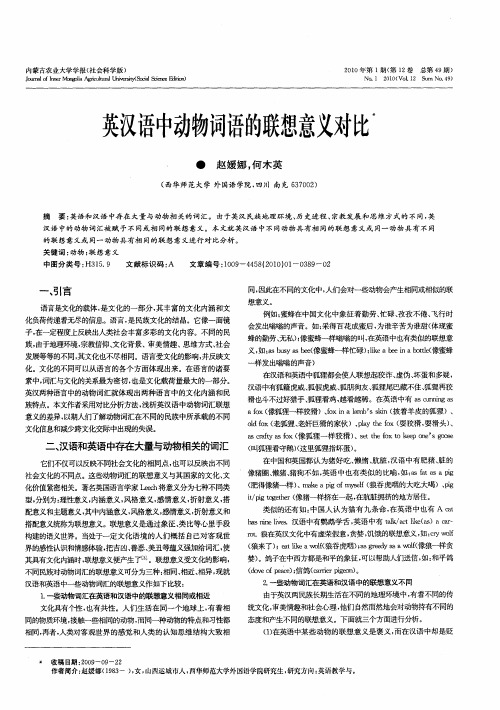
例如: 蜜蜂在中国文化 中象征着勤劳、 忙碌、 孜孜不倦、 飞行时 会发出嗡嗡的声音。如: 采得百花成蜜后 , 为谁辛苦为谁甜( 体现蜜 蜂的勤劳、 无私)像蜜蜂一样嗡嗡的叫, ; 在英语中l 电有类似的联想意 义, a uy8 e( 如: b s be像蜜蜂一样忙碌)le e iabte像蜜蜂 s S i ben o l k a t(
一
族, 由于地理环境 , 宗教信仰 、 文化背景、 审美情趣 、 思维方式、 社会 发展等等的不同, 其文化也不尽相同。语言受文化的影响, 并反映文 化。文化的不同可以从语言的各个方面体现出来。在语言的诸要 素中, 词汇与文化的关系最为密切, 也是文化载荷量最大的一部分。 英汉两种语言中的动物词汇就体现出两种语言中的文化内涵和民 族特点。本文作者采用对比分析方法, 浅析英汉语 中动物词汇联想
内蒙古农业大学学报( 会科 学版) 社
.
21 0 0年第 1 ( 1 期 第 2卷
总第 4 9期)
『 a盯 o Inr[: oi gi l rl v t(。 S 日c Ai n fne vz l l' aA rut a U e yS c d l  ̄ c u eF t 0 k
Nn l 2 1 Vo. 2 S m o 4 ) 0 0( I1 u N . 9
二、 汉语和英语中存在大量与动物相关的词汇
它们不仅可以反映不同社会文化的相同点, 也可以反映出不同 社会文化的不同点。这些动物词汇的联 想意义与其国家的文化、 文 化价值紧密相关 。著名英国语言学家 L eh ec 将意义分为七种不同类 型, 分别为 : 理性意义 , 内涵意义 , 风格意义, 感情意义 , 折射意义 , 搭 配意义和主题意义, 其中内涵意义, 风格意义 , 感隋意义, 折射意义和 搭配意义统称为联想意义。联想意义是通过象征 、 比争 里手段 类 构建的语义世界 。当处于一定文化语境的人们概括 自己对客观世
英汉动植物词汇文化联想意义对比分析

英汉动植物词汇文化联想意义对比分析英汉动植物词汇在两种语言文化中具有不同的意义和联想,这不仅反映了两种语言的不同文化传统,还展现了人们对动植物的不同观念和理解。
本文将对英汉动植物词汇的文化联想意义进行对比分析,探讨两种语言文化对动植物的不同认知和对待方式。
1. 川杜鹃 Rhododendron在中文文化中,川杜鹃是一种高山植物,常生长在海拔较高的地区,因此人们常用川杜鹃来比喻顽强不屈的品格。
而在英文文化中,Rhododendron常被用来形容华丽的花园景观,寓意美好和浪漫。
这表明在不同文化中,对同一种植物的认知和联想有着不同的文化意义。
2. 夜莺 Nightingale二、英汉动植物词汇的文化内涵差异分析1. 文化传统的差异英汉动植物词汇的文化联想意义差异主要源于两种文化传统的不同。
英国是一个以花园景观和自然风光著称的国家,因此动植物在英文中通常与美好的自然景观和艺术意境联系在一起。
而中国是一个有着悠久农耕传统的国家,因此动植物在中文中通常与农耕文化和勤劳力作联系在一起。
2. 对动植物的态度差异中英两种文化对动植物的态度也有所不同。
在英国,人们注重对动植物的保护和赏识,因此对动植物的词汇联想往往与自然保护和环保意识联系在一起。
而在中国,人们对动植物的态度则更多地与农耕生产和传统意义联系在一起,因此对动植物的词汇联想往往与丰收和劳作意识联系在一起。
英汉动植物词汇文化联想意义的对比分析为我们提供了一种跨文化比较的视角,不仅让我们更深入地了解了英汉两种语言文化对动植物的认知和诠释,还提醒我们在进行跨文化交流和交流时,要重视文化差异,尊重对方的文化传统和价值观念。
1. 加强跨文化交流和理解在进行跨文化交流时,我们应该加强对不同文化的尊重和理解,学会从对方的角度去思考问题,接纳对方的文化传统和价值观念,避免基于自己的文化标准去评判对方的行为和言论。
2. 增强文化自信和包容在加强跨文化交流的我们也应该增强自己的文化自信,让世界更多地了解我们的文化传统和价值观念,促进文化交流和融合。
英汉动物词汇的联想意义及翻译

英汉动物词汇的联想意义及翻译摘要:动物词汇在英汉语言中十分丰富,因中西思维、文化背景的不同,动物在英汉语言中的联想意义也大相径庭。
本文从鼠,龙,牛和马的联想意义着手,分析英汉动物所反映的相同或不同意义及其相应翻译。
关键词:联想意义“鼠、龙、牛、马” 翻译。
一、引言英国语言学家利奇把词汇分成七种:概念意义、内涵意义、社会意义、情感意义、反映意义、搭配意义及主题意义。
除了概念意义和主题意义,利奇把其余五种统称为联想意义。
语言因各种联想意义而变得丰富多彩,但英汉中因文化原因使一些联想意义相同或存在区别。
由于中西方在地理位置、生活环境、历史进程等方面的差异,导致了人们不同的文化观念和思维方式,因此,对待动物的感情色彩也相去甚远。
动物是伴随人类发展不可缺少的一部分,它们在英汉语言中所体现的联想意义也存在分歧。
以词汇的不同分类为指导,除了词汇本身的概念意义,词汇的其它联想意义也蕴含着丰富的感情色彩,通过对动物词汇“鼠、龙、牛、马”联想意义的学习,更能深入了解中西文化及提高语言学习。
二、动物词汇的联想意义不同的思维方式和文化观念,使中西人民对待事物的看法也各有千秋。
动物也一样,对于同一个动物,人们可能赋予同样的情感,也可能赋予不同的情感,因此其联想意义也有同有异。
(一)词汇相同,联想意义相同中西对“鼠”,“rat”的相同联想意义老鼠似乎是大自然设置给人类的天敌。
汉语中,一提到鼠,人们产生的就是一种厌恶的感觉,这是和老鼠的生活环境和生活习惯密切相关的。
鼠是小型啮齿类动物,嗜吃好偷,和鼠联系在一起的成语往往有贬义的倾向,如“獐头鼠目、贼眉鼠眼、鼠目寸光、鼠肚鸡肠”等来形容气量狭窄,眼光短浅;用“鼠窜狗盗、狼奔鼠偷”指责偷窃之事;还有“奉头鼠窜、狐奔鼠窜、鸟骇鼠窜、老鼠过街,人人喊打”来形容狼狈的窘境。
西方对“rat”产生的情感和中国人民是如出一辙,认为“rat”的品质也是嗜吃好偷,心胸狭窄和胆小怕事之辈。
人们对“rat”产生的联想也是和贬义联系在一起的,在英语中不乏关于“rat”的英语词汇“a rat in the hole洞中之鼠,as short-sighted as mice鼠目寸光,as timid as a mouse胆小如鼠,dig house to find rats掘室求鼠。
英汉动物词汇的联想意义及翻译

关键词 : 想意义 联
一
“ 、 、 、 ” 翻译。 鼠 龙 牛 马
引 言 英 国语 言 学 家 利 奇 把 词 汇 分 成 七 种 : 念 意 义 、 概 内涵 意 义 、 社
、
式 , 俗 习 惯 等 的 不 同 , 方 对 da o 风 西 rg n的理 解 和 我 们 几 乎 完 全 不 同 。 西 方 神 话 中 ,d a o 在 “ rg n是 一 只 巨 大 的蜥 蜴 , 长着 翅 膀 . 身上 有 磷, 拖着 一 条 长长 的蛇 尾 , 能够 从 嘴 中喷 火 。” 《 经 》 《 约 》 在 圣 的 新 部 分 , rg n就 是恶 魔 撒 旦 的代 表 。《 dao 以赛 业 书 》 中有 这 样 的 话 :
2 1 年 6月 01 n罐 毫
第 2 期 总 59 1 2 期
V0,2 t 9 5
英 汉 动 物 词 汇 的 联 想 意外 语 学 院 重 庆 四 中图 分 类 号 : 3 H0
403 0 0 1)
文 献 标 识 码 : A
文 章 编 号 :0 8 9 5 (O ) - 0 9 0 1 O — 2 X 2 1 O6 0 1 - 2 1
o v aha he t se n e nd hewilpu o d a h t e drg n n Le it n,t witd s ak ;a l tt e t h a o
英汉动植物词汇文化联想意义对比分析

英汉动植物词汇文化联想意义对比分析
动植物词汇作为语言中不可或缺的重要部分,既是表达自然界事物特征的必要工具,也是反映人们文化认知、价值观念、生活方式的重要载体。
本篇文章将针对英汉动植物词汇,从文化联想、意义对比两个维度进行分析,展现其文化价值的多样性和丰富性。
1.文化联想
文化联想指的是在动植物词汇中所蕴含的文化内涵、象征意义和风俗习惯等,是一种基于文化背景的思维方式。
英语中的falcon(隼),它寓意着速度和尊贵。
在英国历史上,隼是贵族的狩猎工具,被称为“王室的鸟”。
同时,隼也是欧洲足球杯的吉祥物,象征着速度、力量和胜利。
而在汉语中,苹果代表爱情和和平。
这个词在中国文化中有着重要的象征意义。
例如,苹果跟苗条谐音,送苹果就代表着希望对方身体健康;苹果分别有红色和绿色之分,而红色常常象征爱情和热情,所以很多人会选择送红苹果表达感情。
2.意义对比
意义对比指的是英文和中文动植物词汇在意义方面的异同。
英文的peacock(孔雀)和中文的孔雀在意义上可以说差异极大。
在西方,孔雀象征高贵华丽,神秘而美丽。
它美丽的羽毛被视为珍宝,在装饰和艺术领域中得到广泛应用。
在英国,孔雀也是皇室的象征之一。
然而,在中国文化中,孔雀寓意着和平和吉祥。
《诗经》中就有“振振鸡鸣,有勿斯受之;振振鸡鸣,有勿斯举之,首如飞蓬,蒿其髻矣”这样的古诗在描述了孔雀显赫的美貌后,表达出了君子要识得不合适的东西,但是别受其所迫,认真分辨。
所以在东方文化中,孔雀对人类的关系是和睦、平和的,孔雀主要象征的是为人们带来吉祥平安的好兆头。
英汉动植物词汇文化联想意义对比分析

英汉动植物词汇文化联想意义对比分析动植物词汇在中英文中具有不同文化意义,反映了两种文化对于动植物的不同观点、习俗和价值观。
下面就英汉动植物词汇的文化联想意义进行对比分析。
动物在中英文中往往有不同的象征意义。
在中国文化中,动物往往象征着吉祥、幸福和长寿等美好的寓意。
中国人常用“龙”来表示皇帝的象征,也代表着权力、荣耀和尊贵。
而在英国文化中,“狮子”常常被用作勇敢和力量的象征,因为狮子在英国被视为国家的象征。
“鹰”在英语中常用来表示自由、力量和高傲,而在中国文化中,鹰则象征着尊贵、高尚和英勇。
植物词汇在中英文中的文化意义也存在差异。
在中国文化中,“梅花”被认为是坚贞不屈和高洁的象征,常被用来表达忠诚和坚韧。
而在英国文化中,“玫瑰”则有着浪漫和神秘的寓意,常常被用作表达爱情和美丽。
英国的“四叶草”也被视为幸运的象征,因为据说能找到四叶草的人将具有好运气。
动植物词汇还反映了两种文化对于自然的不同态度。
在中国文化中,人们常常把自然界的东西看作可以利用和尊重的对象,中国人常把动物和植物作为药材使用,追求的是与大自然的和谐共生。
而在英国文化中,人们更多地将动物和植物视为自然界的伙伴,并且常常将他们作为宠物和伴侣,注重与动物和植物的亲密互动。
动物和植物词汇还反映了两种文化对于环境保护的不同重视程度。
在中国文化中,很多动植物词汇都寄托着人们对于自然环境和生态平衡的关注,因此也体现了深厚的环保意识。
相比之下,在英国文化中,动植物词汇虽然也有一定的环境保护意义,但整体上更强调对自然的享受和欣赏。
英汉动植物词汇的文化联想意义存在一定的对比。
通过分析动物和植物词汇,可以更好地理解和比较中英两种文化的观点、习俗和价值观,这对于促进不同文化间的交流和了解具有重要的意义。
也可以启发人们在文化交流中更加充分地挖掘和利用动植物词汇的文化寓意,以促进文化多样性的发展和传承。
论英汉动物词之联想意义

论英汉动物词之联想意义英汉两种语言都有自己丰富的动物词汇,这些词汇不仅仅是为了描述动物或者表示一种事物,更是具有深刻的文化内涵和联想意义。
本文将从英汉动物词的形象联想、文化内涵以及象征意义三个方面,探讨英汉动物词之间的联想意义。
一、动物形象联想1.猫猫在中国文化中一直都是吉祥的象征,在英国文化中则被视为独立自主、自由自在的宠物。
因此,中英两种文化对猫的形象联想也截然不同。
中文中的“猫眼珠”代表着聪明、灵活的特性,而英文中的“a cat's eyes”则表示目光锐利。
2.鹦鹉在英语中,“鹦鹉学舌”成语表示的是模仿别人说话,而“鹦鹉”这个词本身也意味着重复的东西,不断的重复毫无意义。
而在中文中,“鹦鹉螺”代表着美好的形跟,而“鹦鹉文”则表示用复杂华丽的手法写作。
3.大象大象在英国文化中被赋予了深刻的象征意义,被称为“动物之王”,象征着力量、智慧、忠诚和长寿,是英国王室纹章中的重要元素之一。
而在中文中,象征形象则侧重于其庞大的身躯和高贵的形象,是中国传统文化中的圣兽之一。
二、文化内涵1.龙中国文化中的龙是文化符号和精神产物,代表着权力、至高无上的地位、神秘和神圣。
在中国文化中,有很多词汇和成语和龙有关,如“龙飞凤舞”、“龙狮表演”等。
而在英国文化中,龙则被视为神话传说中的一种生物,代表着狡猾和邪恶。
2.鹰鹰在英国文化中是快速、机智和力量的象征,因此,英国王室的纹章中也有鹰的形象。
而在中国文化中,鹰则被特别赋予了意义,是一种勇敢、坚韧和冷静的动物,被用来象征中国传统精神中的“英雄本色”。
3.熊猫熊猫作为中国文化中的国宝级动物,被赋予了独特的地位和价值。
在中英两国的文化中,熊猫都代表着和平、友好和温暖,是中英两国友好关系的象征。
在英语中,“panda diplomacy”一词就证明了这种象征意义,它意味着中国通过赠送熊猫去加强与其他国家的关系。
三、象征意义1.蝴蝶蝴蝶在中英两种文化中都代表着新生、变化和成长。
英汉动植物词汇文化联想意义对比分析
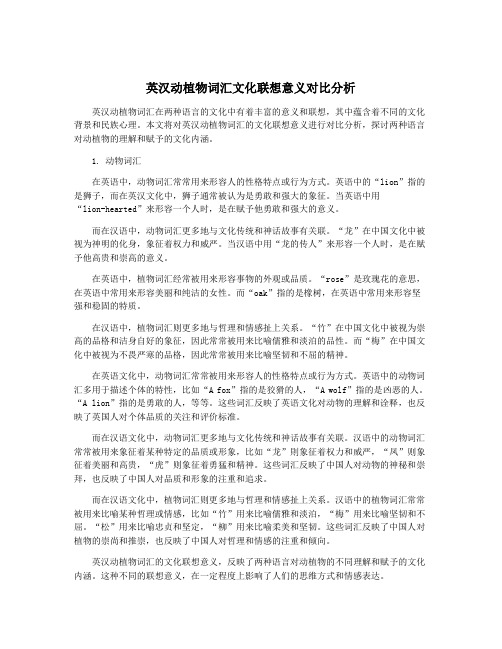
英汉动植物词汇文化联想意义对比分析英汉动植物词汇在两种语言的文化中有着丰富的意义和联想,其中蕴含着不同的文化背景和民族心理。
本文将对英汉动植物词汇的文化联想意义进行对比分析,探讨两种语言对动植物的理解和赋予的文化内涵。
1. 动物词汇在英语中,动物词汇常常用来形容人的性格特点或行为方式。
英语中的“lion”指的是狮子,而在英汉文化中,狮子通常被认为是勇敢和强大的象征。
当英语中用“lion-hearted”来形容一个人时,是在赋予他勇敢和强大的意义。
而在汉语中,动物词汇更多地与文化传统和神话故事有关联。
“龙”在中国文化中被视为神明的化身,象征着权力和威严。
当汉语中用“龙的传人”来形容一个人时,是在赋予他高贵和崇高的意义。
在英语中,植物词汇经常被用来形容事物的外观或品质。
“rose”是玫瑰花的意思,在英语中常用来形容美丽和纯洁的女性。
而“oak”指的是橡树,在英语中常用来形容坚强和稳固的特质。
在汉语中,植物词汇则更多地与哲理和情感扯上关系。
“竹”在中国文化中被视为崇高的品格和洁身自好的象征,因此常常被用来比喻儒雅和淡泊的品性。
而“梅”在中国文化中被视为不畏严寒的品格,因此常常被用来比喻坚韧和不屈的精神。
在英语文化中,动物词汇常常被用来形容人的性格特点或行为方式。
英语中的动物词汇多用于描述个体的特性,比如“A fox”指的是狡猾的人,“A wolf”指的是凶恶的人。
“A lion”指的是勇敢的人,等等。
这些词汇反映了英语文化对动物的理解和诠释,也反映了英国人对个体品质的关注和评价标准。
而在汉语文化中,动物词汇更多地与文化传统和神话故事有关联。
汉语中的动物词汇常常被用来象征着某种特定的品质或形象,比如“龙”則象征着权力和威严,“凤”则象征着美丽和高贵,“虎”则象征着勇猛和精神。
这些词汇反映了中国人对动物的神秘和崇拜,也反映了中国人对品质和形象的注重和追求。
而在汉语文化中,植物词汇则更多地与哲理和情感扯上关系。
英汉动物词汇的联想意义对比
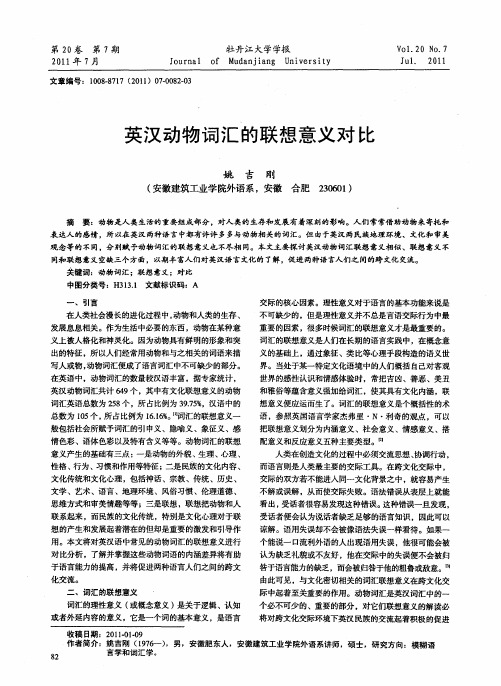
牡 丹 江 大学 学报
J u n 1 o M d n i n U i e s t o r a f u a j a g n v t iy
V _ N .7 ol 20 o
J . u1
2 1 01
文 章 编 号 : 10 .7 7 ( 0 )0 -0 20 0 88 1 2 1 1 70 8 —3
关键 词:动物 词汇;联 想意义;对比 中图分类号 :H3 31 文献标识码 :A 1.
一
、
引言
交际的核心 因素 。理性意义对 于语言 的基本功能来说是 不可缺少 的,但是理性意义并不 总是言语交际行为 中最 重要的因素 ,很多时候词汇 的联 想意义生存 、
用。本文将对英汉语 中常见 的动物词汇 的联想 意义进行
对 比分析 ,了解并掌握这些动物词语 的内涵差异将有 助
认为缺乏礼貌 或不友好 ,他在交际 中的失误便不会 被归
于语言能力的提高,并将促进两种语言人们之间的跨文
化交 流。 二、词汇的联 想意义 ’ 词汇的理性 意义 ( 或概 念意义 )是关 于逻辑 、认知 或者 外延 内容的意义 ,它是一个 词的基本 意义 ,是语言
发展息息相关 。作 为生 活中必要 的东 西 ,动物在某种意 义上被人格化 和神灵化 。因为动物具 有鲜 明的形象 和突 出的特征 ,所 以人们经 常用 动物 和与之相关的词语来描 写人或物 , 动物词汇便成 了语言词汇 中不可 缺少 的部 分。
词汇 的联想意义是人们在长期 的语言实践 中,在概念意 义的基础上 ,通过象征 、类 比等心理手段构造 的语义世
文化 传统和文化心理 ,包括神话 、宗教 、传统 、历史 、
英汉动物词联想意义的类型
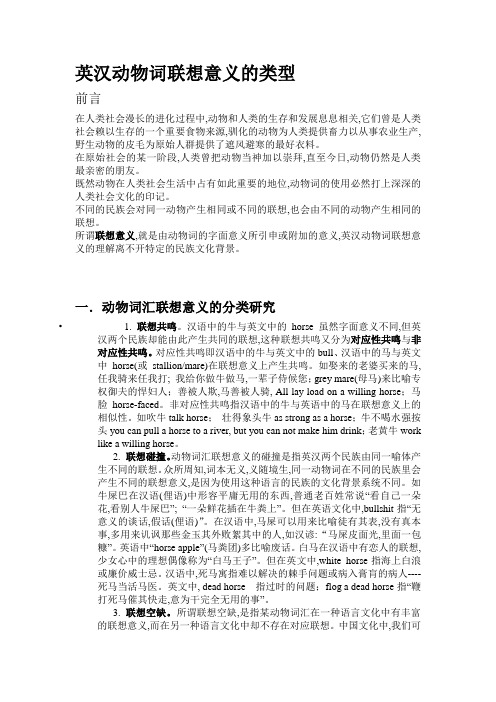
英汉动物词联想意义的类型前言在人类社会漫长的进化过程中,动物和人类的生存和发展息息相关,它们曾是人类社会赖以生存的一个重要食物来源,驯化的动物为人类提供畜力以从事农业生产,野生动物的皮毛为原始人群提供了遮风避寒的最好衣料。
在原始社会的某一阶段,人类曾把动物当神加以崇拜,直至今日,动物仍然是人类最亲密的朋友。
既然动物在人类社会生活中占有如此重要的地位,动物词的使用必然打上深深的人类社会文化的印记。
不同的民族会对同一动物产生相同或不同的联想,也会由不同的动物产生相同的联想。
所谓联想意义,就是由动物词的字面意义所引申或附加的意义,英汉动物词联想意义的理解离不开特定的民族文化背景。
一.动物词汇联想意义的分类研究• 1. 联想共鸣。
汉语中的牛与英文中的horse虽然字面意义不同,但英汉两个民族却能由此产生共同的联想,这种联想共鸣又分为对应性共鸣与非对应性共鸣。
对应性共鸣即汉语中的牛与英文中的bull、汉语中的马与英文中horse(或stallion/mare)在联想意义上产生共鸣。
如娶来的老婆买来的马,任我骑来任我打; 我给你做牛做马,一辈子侍候您;grey mare(母马)来比喻专权御夫的悍妇人;善被人欺,马善被人骑, All lay load on a willing horse;马脸horse-faced。
非对应性共鸣指汉语中的牛与英语中的马在联想意义上的相似性。
如吹牛talk horse;壮得象头牛as strong as a horse;牛不喝水强按头you can pull a horse to a river, but you can not make him drink;老黄牛worklike a willing horse。
2. 联想碰撞。
动物词汇联想意义的碰撞是指英汉两个民族由同一喻体产生不同的联想。
众所周知,词本无义,义随境生,同一动物词在不同的民族里会产生不同的联想意义,是因为使用这种语言的民族的文化背景系统不同。
英汉动植物词汇文化联想意义对比分析
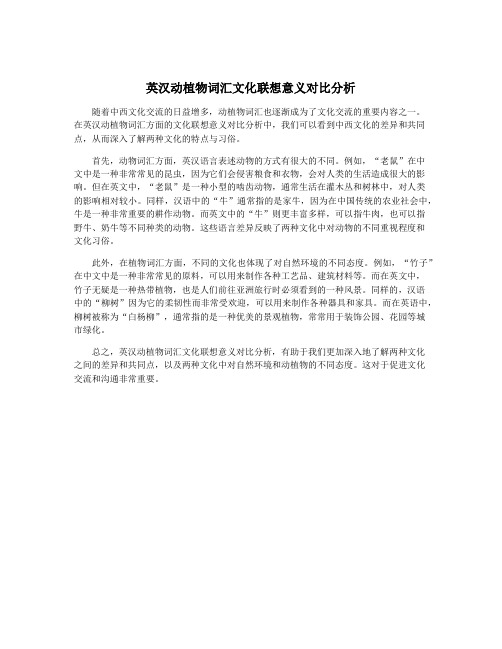
英汉动植物词汇文化联想意义对比分析
随着中西文化交流的日益增多,动植物词汇也逐渐成为了文化交流的重要内容之一。
在英汉动植物词汇方面的文化联想意义对比分析中,我们可以看到中西文化的差异和共同点,从而深入了解两种文化的特点与习俗。
首先,动物词汇方面,英汉语言表述动物的方式有很大的不同。
例如,“老鼠”在中
文中是一种非常常见的昆虫,因为它们会侵害粮食和衣物,会对人类的生活造成很大的影响。
但在英文中,“老鼠”是一种小型的啮齿动物,通常生活在灌木丛和树林中,对人类
的影响相对较小。
同样,汉语中的“牛”通常指的是家牛,因为在中国传统的农业社会中,牛是一种非常重要的耕作动物。
而英文中的“牛”则更丰富多样,可以指牛肉,也可以指
野牛、奶牛等不同种类的动物。
这些语言差异反映了两种文化中对动物的不同重视程度和
文化习俗。
此外,在植物词汇方面,不同的文化也体现了对自然环境的不同态度。
例如,“竹子”在中文中是一种非常常见的原料,可以用来制作各种工艺品、建筑材料等。
而在英文中,
竹子无疑是一种热带植物,也是人们前往亚洲旅行时必须看到的一种风景。
同样的,汉语
中的“柳树”因为它的柔韧性而非常受欢迎,可以用来制作各种器具和家具。
而在英语中,柳树被称为“白杨柳”,通常指的是一种优美的景观植物,常常用于装饰公园、花园等城
市绿化。
总之,英汉动植物词汇文化联想意义对比分析,有助于我们更加深入地了解两种文化
之间的差异和共同点,以及两种文化中对自然环境和动植物的不同态度。
这对于促进文化
交流和沟通非常重要。
中英动物文化对比及其翻译
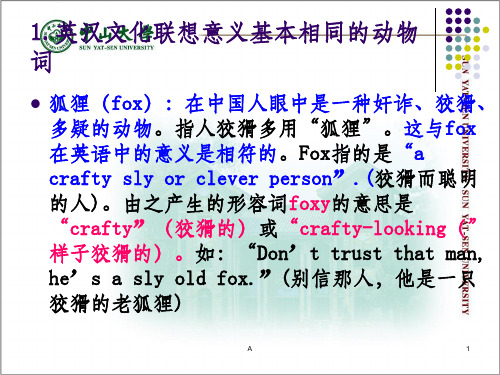
A
10
If you call a woman a dragon, you mean that she is fierce and unpleasant.(如果 把一个女人叫做dragon,意思是她很凶狠,令人 讨厌。)
例如可以说,She’s a bit of a dragon around this place.意思是她在这里是个很跋 扈的人。
“to separate the sheep from the goats(” 分辨好人与坏人)
A
2
狼(wolf)在汉文化中表示凶残、野蛮、杀戮, 因此人们常说“狼子野心”、“狼狈为奸”。 英语中的wolf也让人联想到野蛮残忍。“a wolf in sheep’s clothing”(披着羊皮的 狼)
A
1
绵羊(sheep)在中国人看来是驯服、善良、温 顺、任人宰割的,故有“可怜的小绵羊”, “迷途的羔羊”,“替罪羊”等俗语,表达了 中国人对绵羊的爱怜与同情,英语中sheep也 指驯服、温顺,有些愚钝腼腆的人。
“to follow like sheep”(盲从),
“to cats sheep’s eyes”(抛媚眼),
猫哭耗子 to shed crocodile’s tears
害群之马 black sheep of the duck 如鱼得水 like a duck to water 牛饮 drink like a fish
A
8
龙(dragon):在中国文化中,龙象征着吉祥、 权威、高贵和繁荣。中华民族是‘龙的传人’, 封建时代用龙作为皇帝的象征,还有一些词语 如‘龙腾虎跃、龙飞凤舞、龙凤呈祥’等,这 些体现了龙在汉文化中的内涵。
A
6
牛和马:英语中的牛与英文中的马,在文化联 想中很对应。牛在中国人心目中是终日劳碌, 埋头苦干,无私奉献的典范,汉语中有不少赞 美牛的,而西方人对牛的看法却是横冲直撞, 桀骜不逊,在许多情况下,中文中的“牛”和 英文中的horse形象正好吻合。
英汉动植物词汇文化联想意义对比分析
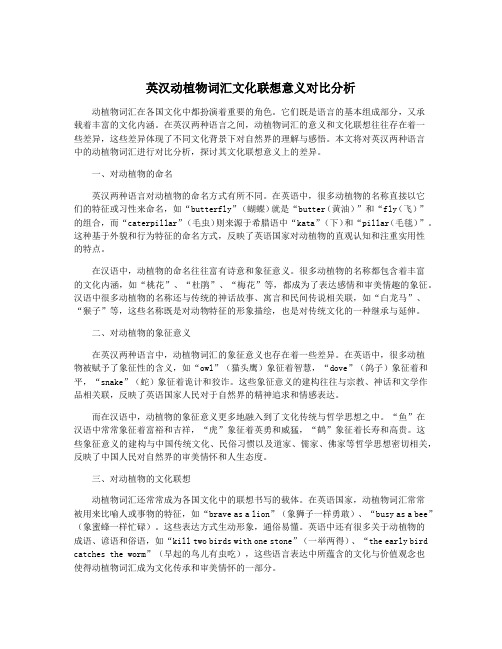
英汉动植物词汇文化联想意义对比分析动植物词汇在各国文化中都扮演着重要的角色。
它们既是语言的基本组成部分,又承载着丰富的文化内涵。
在英汉两种语言之间,动植物词汇的意义和文化联想往往存在着一些差异,这些差异体现了不同文化背景下对自然界的理解与感悟。
本文将对英汉两种语言中的动植物词汇进行对比分析,探讨其文化联想意义上的差异。
一、对动植物的命名英汉两种语言对动植物的命名方式有所不同。
在英语中,很多动植物的名称直接以它们的特征或习性来命名,如“butterfly”(蝴蝶)就是“butter(黄油)”和“fly(飞)”的组合,而“caterpillar”(毛虫)则来源于希腊语中“kata”(下)和“pillar(毛毯)”。
这种基于外貌和行为特征的命名方式,反映了英语国家对动植物的直观认知和注重实用性的特点。
在汉语中,动植物的命名往往富有诗意和象征意义。
很多动植物的名称都包含着丰富的文化内涵,如“桃花”、“杜鹃”、“梅花”等,都成为了表达感情和审美情趣的象征。
汉语中很多动植物的名称还与传统的神话故事、寓言和民间传说相关联,如“白龙马”、“猴子”等,这些名称既是对动物特征的形象描绘,也是对传统文化的一种继承与延伸。
二、对动植物的象征意义在英汉两种语言中,动植物词汇的象征意义也存在着一些差异。
在英语中,很多动植物被赋予了象征性的含义,如“owl”(猫头鹰)象征着智慧,“dove”(鸽子)象征着和平,“snake”(蛇)象征着诡计和狡诈。
这些象征意义的建构往往与宗教、神话和文学作品相关联,反映了英语国家人民对于自然界的精神追求和情感表达。
而在汉语中,动植物的象征意义更多地融入到了文化传统与哲学思想之中。
“鱼”在汉语中常常象征着富裕和吉祥,“虎”象征着英勇和威猛,“鹤”象征着长寿和高贵。
这些象征意义的建构与中国传统文化、民俗习惯以及道家、儒家、佛家等哲学思想密切相关,反映了中国人民对自然界的审美情怀和人生态度。
三、对动植物的文化联想动植物词汇还常常成为各国文化中的联想书写的载体。
英汉动植物词汇文化联想意义对比分析
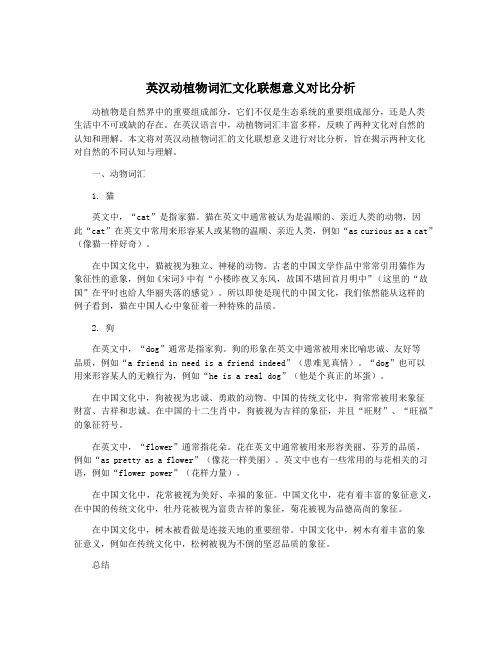
英汉动植物词汇文化联想意义对比分析动植物是自然界中的重要组成部分,它们不仅是生态系统的重要组成部分,还是人类生活中不可或缺的存在。
在英汉语言中,动植物词汇丰富多样,反映了两种文化对自然的认知和理解。
本文将对英汉动植物词汇的文化联想意义进行对比分析,旨在揭示两种文化对自然的不同认知与理解。
一、动物词汇1. 猫英文中,“cat”是指家猫。
猫在英文中通常被认为是温顺的、亲近人类的动物,因此“cat”在英文中常用来形容某人或某物的温顺、亲近人类,例如“as curious as a cat”(像猫一样好奇)。
在中国文化中,猫被视为独立、神秘的动物。
古老的中国文学作品中常常引用猫作为象征性的意象,例如《宋词》中有“小楼昨夜又东风,故国不堪回首月明中”(这里的“故国”在平时也给人华丽失落的感觉)。
所以即使是现代的中国文化,我们依然能从这样的例子看到,猫在中国人心中象征着一种特殊的品质。
2. 狗在英文中,“dog”通常是指家狗。
狗的形象在英文中通常被用来比喻忠诚、友好等品质,例如“a friend in need is a friend indeed”(患难见真情)。
“dog”也可以用来形容某人的无赖行为,例如“he is a real dog”(他是个真正的坏蛋)。
在中国文化中,狗被视为忠诚、勇敢的动物。
中国的传统文化中,狗常常被用来象征财富、吉祥和忠诚。
在中国的十二生肖中,狗被视为吉祥的象征,并且“旺财”、“旺福”的象征符号。
在英文中,“flower”通常指花朵。
花在英文中通常被用来形容美丽、芬芳的品质,例如“as pretty as a flower”(像花一样美丽)。
英文中也有一些常用的与花相关的习语,例如“flower power”(花样力量)。
在中国文化中,花常被视为美好、幸福的象征。
中国文化中,花有着丰富的象征意义,在中国的传统文化中,牡丹花被视为富贵吉祥的象征,菊花被视为品德高尚的象征。
在中国文化中,树木被看做是连接天地的重要纽带。
英汉动物词汇的联想意义比较及翻译
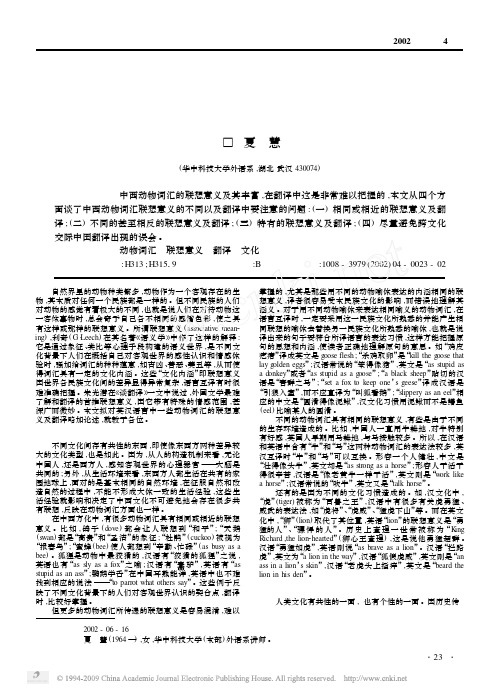
(phoenix) 在中国古代传说中是百鸟之王 ,有“百鸟朝凤”的说 法 。古时 ,人们相信凤凰出现可以预示天下太平 ,所以后世 多以龙比喻皇帝 ,凤凰比喻皇后 ,帝王成婚称为“龙凤呈祥”。 但在英语中 “, phoenix”只是神话传说中的一种鸟 ,在阿拉伯 沙漠生活五 、六百年后自我焚化 ,并由此得到再生 ,故英语中 “phoenix”一 词 有“再 生”、“复 活”等 意 思 。Collins COBUILD English Language Dictionary 中就有这样一个例句“Religion ,like a phoenix ,has been resurrected from the ashes of the revolution”(宗 教就像传说中的凤凰 ,在革命的灰烬中又复活了) 。
中图分类号 : H313 ; H31519 文献标识码 :B 文章编号 :1008 - 3979 (2002) 04 - 0023 - 02
自然界里的动物种类繁多 ,动物作为一个客观存在的生 物 ,其本质对任何一个民族都是一样的 。但不同民族的人们 对动物的感觉有着极大的不同 ,也就是说人们在对待动物这 一客体事物时 ,总会寄予自己各不相同的感情色彩 ,使之具 有这样或那样的联想意义 。所谓联想意义 (associative mean2 ing) ,利奇 ( G·Leech) 在其名著《语义学》中作了这样的解释 : 它是通过象征 、类比等心理手段构建的语义世界 ,是不同文 化背景下人们在概括自己对客观世界的感性认识和情感体
“猫”(cat) 在中国人眼中是温顺乖巧的动物 ,如果按照汉 文化习俗把这句英文“she is a perfect cat”,翻译成“她十分温 顺乖巧”,那就大错特错了 ,英文中“cat”用来描述妇女时 ,是 一个贬义词 ,专指那些爱撒谎 、饶舌 、恶毒的妇人 。“she is a perfect cat”的原意是“她是个十足的长舌妇”。
英汉动物词汇联想意义比较及翻译策略

英汉动物词汇联想意义比较及翻译策略
英汉动物词汇联想意义比较及翻译策略是指在翻译英文中的动物名称时,首先要弄清楚英文单词所代表的动物在英语和汉语中的联想意义,然后再进行相应的翻译。
比如英文中的“cat”一词,它代表的是家猫,而在汉语中则通常意味着狸猫或家猫,因此这里就要根据文本的上下文来判断是指哪种动物,而不能仅仅根据字面意思来确定。
另外,有些英语中的特定动物名称在汉语中并没有相应的翻译,因此在这种情况下,可以采取直译或者解释性翻译的策略,以便使读者能够理解文本中所描述的动物。
- 1、下载文档前请自行甄别文档内容的完整性,平台不提供额外的编辑、内容补充、找答案等附加服务。
- 2、"仅部分预览"的文档,不可在线预览部分如存在完整性等问题,可反馈申请退款(可完整预览的文档不适用该条件!)。
- 3、如文档侵犯您的权益,请联系客服反馈,我们会尽快为您处理(人工客服工作时间:9:00-18:30)。
英汉语言中动物词语的联想意义On the Association of Animal Words in English and ChineseAbstract:The cultural meaning of animal words reflects the culture of a nation from a perspective, and the different cultural meanings of animal words in Englishand Chinese languages reflect the similarities and differences between thesetwo cultures. Some reasons account for this phenomena, such as differentcultural background, different customs, different ways of thinking, ect. So,in my paper I will expound the phenomena from four aspects. The first isthe same animal words with the same or similar associative meanings inEnglish and Chinese. The second is the same animal words with differentassociative meanings in English and Chinese. The third one is the differentanimal words with similar associative meanings in English and Chinese.The last is one animal word has rich associative meanings in one languagebut has no associative meanings in the other languages. With thedevelopment of our society, the globalization is becoming an unavoidabletendency, and human beings contact with each other more and morefrequently. This explains the necessity to understand not only our ownculture but other cultures to facilitate the cross-cultural communication.Moreover, the animal words play an important role in the culture, so it isnecessary for us to understand the associative meanings of animal words soas not to make mistakes.Key words: animal words, associative meanings, intercultural communication摘要:动物词汇的文化意义从一个角度反映了一个民族的文化,英汉语言中动物词汇的不同文化含义反映出英汉文化的异同。
这些不同点的存在有很多原因,比如:不同的文化背景,不同的习俗,不同的思维方式等等。
因此,在我的论文中,我会从四个方面谈这些不同点。
第一个是相同的动物词汇在英汉语言中会产生相同或相似的联想意义。
第二个是相同的动物词汇在英汉语言中会产生不同的联想意义。
第三个是不同的动物词汇在英汉语言会产生相同或相似的联想意义。
最后一个就是一种动物词汇在一种语言中有丰富的联想意义,而在另一种语言中却没有相应的联想意义。
随着社会的发展,全球化已为大势所趋,人们之间的交流越来越频繁。
为了适应世界的发展,我们不仅要知道我们自己的文化,而且要了解其他国家的文化。
另外,动物词汇在语言文化中扮演了重要的角色。
所以,为了在跨文化交际中避免犯错误,了解动物词汇的联想意义对我们来说是很有必要的。
关键词:动物词汇,联想意义,跨文化交际ContentsI. Introduction (1)II.The Associative Meanings of Animal Words (1)A. The same animal words with the same or similar associative meaningsin English and Chinese (1)B. The same animal words with different associative meanings inEnglish and Chinese (3)C. The different animal words with similar associative meanings inEnglish and Chinese (5)D.One animal word has rich associative meanings in one language buthas no associative meanings in the other languages (7)III. The Causes and Influence of the Association of Animal Words in Cross-Cultural Communication (8)IV. Conclusion (9)Works Cited (10)I. IntroductionWith the development of our society, language plays an important role and it records the process of the development of our social civilization. Human and animals co-exist and contact frequently. Therefore, there are a great quantity of animal words and phrases in human languages. And human endow them with certain feelings and meanings according to animals’ appearances, habits, ect. English and Chinese all have long history and rich cultural heritage. In their languages, there are a lot of animal words with associative meanings. The animal words are the summary of human life, the mark of the development of human language and the symbol of the process of human civilization. Our society is developing very fast. The globalization is influencing our life. Western and Chinese cultures communicate with each other frequently. So it is helpful for us to understand and master the associative meanings of animal words.II. The Associative Meanings of Animal WordsWhen we talk about associative meaning, we should know what the associative meaning is. As we all know, a word has not only its conceptual meaning, but its associative meaning. The conceptual meaning is the basic meaning of a word. However, the associative meaning not only has the relationship with language, but also has deep relationship with culture. The associative meaning of a word is the extended meanings of it. Its appearance is related to the culture, environment, psychology, ect. So, the associative meaning of a word is the total meanings a person thinks of when they hear or see the word.A. The same animal words with the same or similar associative meanings in English and ChineseThere are many phrases which contain certain meanings of animal words. It is very easy to understand their forms, and then we can associate the associative meanings of them. It goes without saying that because of the similarity of the ways of thinking, the same animal words may have the same or similar associative meanings.In English and Chinese languages, people have the same associative meanings to pig. In people’s mind, they think pig is ugly, dirty, lazy, greedy and rough. This isreally unfair. People abuse pig but they eat pork. In Chinese language, there are many phrases about pig, such as “as fat as a pig”, “as lazy as a pig” and so on. These are dirty words which people use them to abuse others. The Pilgrimage to the West is one of the four famous books in China. It is a myth. In this novel, Zhubajie is an ugly, lazy, greedy and lust person and he is very hateful. In English, a pig refers to a greedy, dirty or bad-mannered person. So people always use it to refer to a person who is greedy, lazy and dirty. There are also many idioms of pig which almost have derogatory meanings. For example, “eat like a pig or make a pig of oneself”, “you greedy pig”, “pigs in clover”, “buy a pig in a poke” and so on.The same case happens to the word wolf in English and Chinese. It is associated with violent, cunning and greedy. In Chinese we can find如狼似虎(ferocious),狼心狗肺(ungrateful),狼吞虎咽(wolf down)狼子野心(wolfish ambition)ect. In English, we meet “wolf down”, “throw to the wolves”, “have a wolf by eats”, “cry wolf”, “wolf in sheep’s clothing”, “a sheep among wolves”and so on. They all express derogatory meanings. Moreover, when a wolf represents a person, it means a man who is always ready to make sexual advances to a woman. So in English, there is a idiom “a wolf whistle” which means a man attracts a woman’s attention with whistle when he sees a beautiful woman on the road. In Chinese people always use “Selang”to express this kind of person.Fox represents the person who is very cunning. In English, there have “he is a fox, as cunning as a fox”. Fox also has another meaning. It means sexually attractive woman. In Chinese it is a derogatory meaning and it means “Hulijing”who always seduces man. But in English it has the opposite meaning and it means a very beautiful woman.There are also many other animal words which have the same or very similar associative meanings in English and Chinese. For example, bee symbolizes diligence and the quality of hardworking both in English and Chinese. So we often use the phrase “as busy as a bee” to describe a person who is busy and hardworking. Parrot is a bird which can copy people’s pronunciation. It represents a person who only copies other people and doesn’t have his own opinion. People use ass to describe a person who is stupid and obstinate both in English and Chinese. For instance, “he is rather an ass in some ways”, “make an ass of oneself”B. The same animal words with the different associative meanings in English andChineseBecause of different cultural backgrounds, the same animal words may produce different associative meanings. This reflects the differences between English and Chinese cultures and embodies the individuality of national cultures. Dragon is the most representative example. In Chinese culture, dragon is a capricious supernatural animal. It is not a real animal but an animal which is imagined by human beings. In ancient China, the imperial King named themselves “Zhenlongtianzi”. Common people thought the dragon as their power of spirit. Now we Chinese people all believe that it is the symbol of Chinese nation. Chinese people not only at home but also abroad all name themselves “the offsprings of dragon”. We can find the image and trace of dragon almost everywhere, such as in painting, sculpture, calligraphy and building. Now dragon has become an immortal spirit and we call this as “dragon culture”. So there are many idiomatic phrases in Chinese. For example, 龙腾虎跃(dragons rising and tigers leaping—a scene of bustling activity),生龙活虎(doughty as a dragon and lively as a tiger),龙飞凤舞(like dragons flying and phoenixes dancing —lively and vigorous flourishes in calligraphy)and so on. These all reflect the associative meanings of dragon in Chinese culture. While in western culture, dragon is the representative of evil. It is the devil incarnation. In the Bible, the great dragon refers to Satan. And the old dragon is devil. In English, dragon also means a fierce bad-tempered old woman. Because the same animal words have different associative meanings. People in western countries want to express the concept of dragon in Chinese, they will say Chinese dragon. In Asia, there are three developed countries and one developed area, Japan, Korea, Singapore and Hong Kong. We call them “Sixiaolong”. In order not to make mistakes in communication, we call them four tigers but four dragons.Because of the differences of aesthetic appreciation and social psychology, the same animal words will produce different associative meanings in English and Chinese cultures. Some animal words express good meanings in English, while in Chinese they express derogatory meanings, such as dog, owl and so on. Under most conditions, Chinese people think dog is a very disgusting animal. In Chinese, the words which contain dog almost express derogatory meanings, such as 狗仗人势(like a dog threatening people on the strength of its master’s power—be a fully under the protection of a powerful person),狼心狗肺(ungrateful),狗胆包天(monstrous audacity), ect. And people always abuse others with 狗腿子(lackey),癞皮狗(loathsome creature),狗眼看人低(act like a snob),狗拿耗子多管闲事(poke one’s nose into other people’s business), and so on. In western countries, many people love dog. They raise dogs as their pets and believe dog is man’s best friend. So there are many commendatory phrases which contain dog. For instance, “to be top dog”, “a lucky dog”, “a gay dog”, “as faithful as a dog”, “love me love my dog”, “every dog has its day”, ect. Sometimes, the comparison of dog has obvious derogatory meaning in English, but it is not as strong as in Chinese. For example, “treat someone like a dog”, “live a dog’s life”, “dog eat dog”. In English, people also abuse others by using “you dog”or “a dog in the manger”, but this can not affect the position of dog. Chinese people also like some qualities of dog, such as faithfulness, reliability and cleverness. But they feed dog simply because it is very useful. It can help people to look after their houses.In China, owl is a bird which always goes out and acts at night. Because its crying sounds sad, people often associate its crying with misfortune and they think owl is the sign of unlucky. While western people consider owl is an intelligent bird and it is the symbol of intelligence. In children’s books and cartoons, the image of owl is calm, serious and clever. When animals dispute something, they will let owl to judge. So, in English, there has the idiom “as wise as an owl”. Because owl is used to acting at night, owl is referred to people who often sit up all night or are used to acting at night in English.In Chinese traditional culture, bat and happiness have the same pronunciation, people always use it to express good luck. It is the symbol of auspicious and happiness. However, in English culture, people always associate it with ugliness, vampire, darkness and sin. So there are some phrases like “as blind as a bat”, “have bats in one’s belfry”, “like a bat out of hell”, “as crazy as a bat”, ect.In China, peacock is a bird which is very beautiful and Chinese people think it is an auspicious bird. But sometimes someone who likes himself, we will say he is a peacock. In English, peacock refers to people who are very proud and like to make pretence. So they have the phrases “as proud as a peacock” and “play the peacock”.Magpie refers to people who like to chatter and babble on and on in English. While in Chinese, it is an auspicious bird. It is the symbol of auspicious and lucky. So in China, when people hear the crying of a magpie, they will believe that some happy event will happen.Because fish has the same pronunciation with surplus in Chinese, people oftenbuy the pictures with fish in Spring Festival. This means people have surplus every year and people’s life is better and better. But in English, it describes fish as bad people or bad things. For instance, “a poor fish”, “a loose fish”, “fish in the air” and so on.Petrel is the example of study in Chinese. A lonely petrel in the rain which is flying over the sea bravely is the example of young people. In 2008 Olympic Games, we have five Olympic Mascots and petrel is one of them. So we can see petrel has an important position in China. In western countries, a petrel in the storm predicts the disaster, trouble and violence will come to someone.Phoenix is the King of birds in Chinese. People consider male is Feng and female is Huang. In ancient China, when a man woos a woman, this is called Feng woos Huang. Sometimes, phoenix means something very rare and precious. In western countries, phoenix represents reviving in myth.We are all very familiar with cat. Chinese people like cat because it is very lively and lovely and it can catch rat. So it is very useful. In Chinese culture, it is also the symbol of long life. In some places, when someone walks or drives at night and sees a cat running in front of him, some unfortunate thing will happen to him. In western countries, people think cat does not do anything all day except causing troubles. People hate cat especially black cat. There are many phrases about cat. For example, “no room to swing a cat”, “like a cat on hot bricks”“the cat shuts its eyes when stealing cream” and “the cat out of the bags”.C. The different animal words with similar associative meanings in English and ChineseBecause of different cultural backgrounds, different animal words have similar associative meanings in English and Chinese cultures. That is, in English and Chinese, different animal words express similar associative meanings. Although in the two languages, they use the different animal words, the animal words express similar associative meanings. These animal words have the relationship with the different history of English and Chinese. Also, this embodies the different cognition to objective things of western and Chinese.Bull and horse are two totally different animals, but bull in Chinese culture has similar associative meaning with horse in English culture. Chinese is an agricultural civilization on the continent, so bull is a very important animal. Farmers and bullstayed together every day. Gradually, there formed a deep love for bull in people’s minds. So in Chinese people’s mentality, the image of bull is that it has huge figure, strong body and it is hardworking and selfless. People always speak highly of it. There are a lot of phrases which are used to praise bull, such as 力大如牛(as strong as a horse),钻牛角尖(get into a dead end),对牛弹琴(play the harp to a bull). Luxun has a famous saying “横眉冷对千夫指,俯首甘为孺子牛(Fierce-browned, I coolly defy a thousand pointing fingers; head-bowed, like a willing ox I serve the youngsters)”which people like to quote very much. Of course, we can find some phrases from myth which express derogatory meanings, such as “牛鬼蛇神(monsters and demons —forces of evil;class enemies of all descriptions)”. But there are just a few. In ancient English, people mainly rely on horse to plough land and bull is seldom used to plough land. People only eat beef and drink milk. In their eyes, they just think bull is their food and it only has weak points. For example, “a bull in a china shop”, “like a bull at a gate”, “throw the bull”. John Bull is the nickname of English. It refers to someone who always acts recklessly and is ridiculous. Therefore, in English language, people use “as strong as a horse” to express someone who is mighty and strong, and use “work like a horse” to describe someone who is hardworking.In Chinese culture, tiger is always considered to be the King of all animals. Because it is very strong, powerful and fearful. So there are many words or phrases which relate to tiger. For instance, 虎符(a tiger-shaped tally issued to generals as imperial authorization for troop movement in ancient China),如狼似虎(as ferocious as wolves and tigers),如虎添翼(like a tiger that has grown wings—with might redouble),狐假虎威(The fox borrows the tiger’s terror)and so on. While in western countries, lion is always considered to be the King of all animals. The image of lion is brave, fearful and majestic. British people believe lion is the national emblem of Great Britain. The British Lion refers to British. The English King, Charles the first is called the lion-hearted because of his bravery. Therefore, they use lion to express someone who is very famous. For example, “a literary lion”. There are a lot of idiomatic phrases in English which contain lion, such as “the lion’s share”, “as bold as a lion”, “majestic as a lion”. In English, lion symbolizes power. The seal of British royal family is lion and unicorn. And there are many other phrases about lion. For example, “play oneself in the lion’s mouth”, “like a key in a lion’s hide”. When the phrases are translated into Chinese, people is used to replacing lion with tiger.Sometimes, the same associative meanings may be expressed in different ways inthe animal words of English and Chinese languages. We can find the phenomena in idioms. For example, when we say someone is timid, we will think of “as timid as a rat”in Chinese. Chinese people use rat to describe someone who is timid. But in English, people use rabbit, chicken and pigeon to describe someone who is timid. For instance, “as timid as a rabbit”, “chicken-hearted or pigeon-hearted”.“害群之马”in Chinese equals to “the black sheep of the family”in English. When we say someone who often talks big words, we will say “吹牛” in Chinese and “talk horse” in English. Moreover, there is an idiomatic phrase “瓮中捉鳖” in Chinese. It equals to “a rat in a hole” in English. “落汤鸡” equals to “like a drowned rat” and “一丘之貉” is said to be “birds of a feather”.D. One animal word has rich associative meanings in one language but has no associative meanings in the other languagesDifferent nations have its own language because of the different values, different religions, different aesthetic psychologies, different ways of thinking, different customs and so on. In a way, the particularity of language is the particularity of national culture. Language records the history of a nation. The same animal word has rich associative meanings in one culture, but has no corresponding associative meanings in the other cultures.Bull had a deep effect on Chinese traditional agriculture and it also plays an important role on Chinese traditional culture. Of course, there are many vocabularies about bull. For example, “老黄牛(a willing ox)”, “吹牛皮(talk horse)”, “钻牛角尖(get into a dead end)”ect. From ancient to now, Chinese people like to compare them to bull.There are some animal words with associative meanings in English but without associative meanings in Chinese. For example, in English, there are many idiomatic phrases about horse, “back the wrong horse”, “change horse”, “from the horse’s mouth”, “never swap horses while crossing the stream”, “put the cart before the horse”, “work for a dead horse”, “you may take a horse to the water, but you can not make him drink”, “horse doctor”, “horse laugh”and so on. Horse has certain associative meanings in these idiomatic phrases. But it is very difficult to find corresponding associative meanings in Chinese.As we all know, panda is very lovely and people all like it very much. But it only can be seen in China. Because it is big and walks very slowly, when people saysomeone who does something in a slow way, they will say he is like a panda. While in western countries, people almost have not seen a panda because of the environment. So there is no associative meaning of panda in English.Beaver does not exist in China. So Chinese people only know it is an animal. But in English, “eager beaver” means someone who is hardworking to do something but is impatient in order to fulfill something. When it expresses derogatory meaning, beaver means someone who is very hardworking for the purpose of pleasing his boss.Crane is the symbol of long life in China. Chinese people often associate it with pine because of the idiomatic phrase “松鹤延年”. Because of the geographical environment, crane does not exist in western countries. So crane does not have associative meanings in English..III.The influence of the association of animal words in cross-cultural communicationThe animal words in English and Chinese cultures not only have the same or similar associative meanings, but also have very different associative meanings and sometimes it is very difficult for us to understand. The American linguist Lade indicates that: “When students learn a foreign language, they may find some points are easy and some are difficult to understand. The points which are similar to native language are very easy to them, while the points which are different from native language are very difficult to understand. Therefore, we should pay more attention to the differences of the associative meanings of animal words in English and Chinese”. From the differences, we can see if we only understand the literary meanings of the animal words and we do not master the associative meanings, we will be prone to make some mistakes in intercultural communication, or we may cause cultural conflict.A. The differences of associative meanings of animal words in English and Chinese cultures may cause mistakes in cultural communication.Different understandings of animal words can cause misunderstandings on communicative purpose. For example, people have different understandings on bat in English and Chinese. In English, people are afraid of bat and hate it. When they think of bat, they will associate it with ugliness and evil. So the idioms which are about batexpress derogatory meanings in English, such as “as blind as a bat”. While in Chinese, because of the same pronunciation of bat and happiness, bat represents good luck and happiness, especially red bat. If Chinese people describe someone who is timid, they will use rat or mouse. So when we see the phrase “as quiet as a mouse” in English, we may misunderstand it as “as timid as a rat or mouse”. On the contrary, the meaning of “as quiet as a mouse” refers to someone who is very calm when he meets things in Chinese.IV. ConclusionBy the comparison of the associative meanings of animal words in English and Chinese, we can see every animal word is not only the representative of the image of the animal, but also some associative meanings because of cultural differences. Meanwhile, the different associative meanings of animal words in English and Chinese produce some deep effect on intercultural communication. Therefore, when we learn English, we should not only master its literal meaning, but also its associative meaning. (Deng and Liu)The associative meaning of a word is different from its literary meaning. For English learners, we should not only master the literary meaning of a word, but we should know its associative meaning. If we do not know its associative meaning, we may make mistakes in communication. We should associate the word with its culture.Globalization has profound influence on the culture of every nation. We need to communicate with other cultures in the world. And when we communicate with the people who have different cultures, we need to pay more attention to their culture in order to avoid some misunderstandings. Under this condition, it is necessary for us to know the animal words well because of their important position in the culture.Works Cited包惠南. 文化语境与语言翻译[M]. 北京:中国对外翻译出版公司,2001包惠南包昂. 中国文化与汉英翻译[M]. 北京:外文出版社,2004邓炎昌刘润清等. 语言与文化[M]. 北京:外语教学与研究出版社,1991金圣华. 桥畔泽谈:翻译散论八十篇[M]. 北京:中国对外翻译出版公司,1997覃先美. 英语动物文化考释[M]. 长沙:国防科技大学出版社,2002闫传海张梅娟. 英汉词汇文化对比研究[M]. 西安:西安交通大学出版社,2008张良军王庆华王蕾. 实用英汉语言对比教程[M]. 哈尔滨:黑龙江人民出版社,2006。
